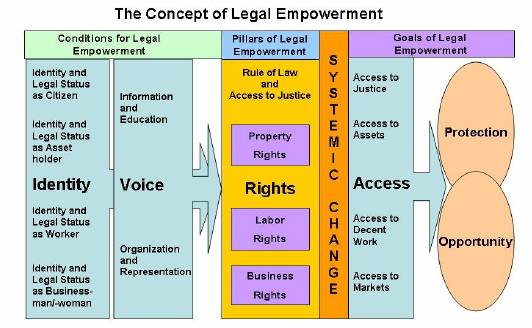As the food crisis grows, a report finds four billion people are excluded from the rule of law the UN Commission on Legal Empowerment of the Poor makes a global call to make legal empowerment a key pillar of the anti-poverty agenda.
A blog on Asset-building, states “The report eloquently provides a richer perspective on how and why wealth (among other) inequalities persist within societies. It delves deep into the persistence of poverty through lack of access to justice and such essential rights as an identity, in most countries a requisite for access to anything asset-building related – property, real estate, pensions, social transfers, micro-credit or even the most basic financial services. Essentially, the lack of identity makes this vulnerable population virtually invisible to the formal economy or society, which in turn denies them basic rights necessary for them to access the opportunities and protections afforded to and taken for granted by the rest of us.”
The report itself states “The current food crisis is a symptom of the problem. If poor farmers do not have title to their land, they can’t borrow against it, are unable to invest in improvements, and have less incentive to conserve the land’s value,†said Madeleine K. Albright, who co-chairs the independent Commission. “A country benefits from a large group of farmers operating with the protection of law, growing food for the domestic market. Such a country will be less vulnerable to fluctuations in global prices and less dependent on the help of others.”
Chart from the dowloadable document 
Legal Empowerment is hosted by the United Nations Development Programme (UNDP).
Legal Empowerment was launched in 2005 by a group of developing and industrialized countries including Canada, Denmark, Egypt, Finland, Guatemala, Iceland, India, Norway, Sweden, South Africa, Tanzania and the United Kingdom, and has a mandate to complete its work in 2008.
Co-chairs Madeleine Albright and Hernando de Soto briefly discussed the Commission’s findings and this report this morning at a press conference at the United Nations as well as in their recent Time op-ed. As eloquently as they both discussed the foundations and findings of the report in a few short minutes, the full report is brilliant, powerful and well worth the read.
Tags: Advocacy, Anti-poverty strategies, Poverty Analysis
